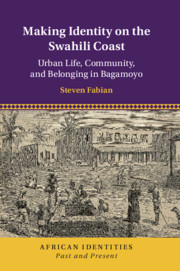Book contents
- Making Identity on the Swahili Coast
- African Identities: Past and Present
- Making Identity on the Swahili Coast
- Copyright page
- Dedication
- Contents
- Illustrations
- Preface
- A Note on Spellings and Currency
- A Note on Nomenclature
- Abbreviations
- Maps
- Introduction
- Part One Becoming Bagamoyo
- Part Two Fitting into their Way of Life: Local Community and Colonial Control
- Epilogue
- Glossary
- Select Bibliography
- Index
Epilogue
Published online by Cambridge University Press: 28 October 2019
- Making Identity on the Swahili Coast
- African Identities: Past and Present
- Making Identity on the Swahili Coast
- Copyright page
- Dedication
- Contents
- Illustrations
- Preface
- A Note on Spellings and Currency
- A Note on Nomenclature
- Abbreviations
- Maps
- Introduction
- Part One Becoming Bagamoyo
- Part Two Fitting into their Way of Life: Local Community and Colonial Control
- Epilogue
- Glossary
- Select Bibliography
- Index
Summary
The period of nationalism – 1955–1965 – provides a fitting denouement to bring home the persistence – and relevance – of local urban identity. Having already studied the Wabagamoyo’s behavior in the face of three rounds of imperialism, how did they perceive nationalism and the push for self-rule? This was not a question that was articulated much in Bagamoyo until 1955, the year after Julius K. Nyerere assumed leadership over the Tanganyika African Association and transformed it into the Tanganyika African National Union (TANU), a national political party. TANU activists had difficulty whipping up support in Bagamoyo because “many inhabitants did not believe that this country was theirs but that of the English.” The statement reflects the longstanding local orientation of a community which was incorporated into a “state-nation” system of administration that was imposed upon them by foreigners. In other words, Tanganyika was a colonial creation into which Bagamoyo became incorporated. The town may have been made up of peoples who came from diverse parts of the former German colony, but there did not exist a strong sense of nationalism among the Bagamoyo populace.
- Type
- Chapter
- Information
- Making Identity on the Swahili CoastUrban Life, Community, and Belonging in Bagamoyo, pp. 295 - 309Publisher: Cambridge University PressPrint publication year: 2019

